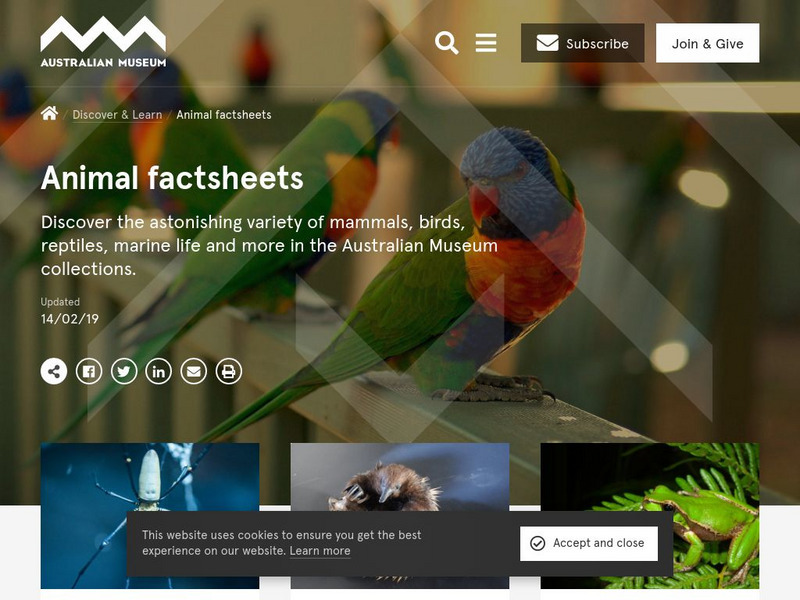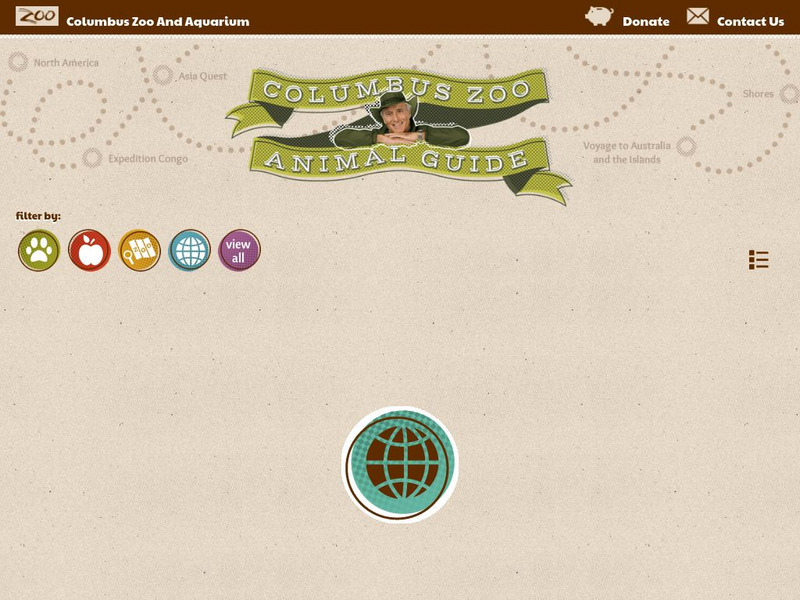Hi, what do you want to do?
Unite for Literacy
Unite for Literacy: Animals: Small and Mighty Mammals
Learn about some of the special skills some small mammals have. Includes audio narration in Turkish and English, with text in English.
National Geographic Kids
National Geographic Kids: Animals: Koala
"Koalas are marsupials, related to kangaroos." Fun facts, video and audio clips make this a great National Geographic site for student research projects.
PBS
Pbs Learning Media: Jaws and Teeth of Mammals
This image from Biology by Kenneth R. Miller and Joseph Levine illustrates the relationship between structure and function by comparing the jaws and teeth of two animals with very different ways of life: the wolf and the horse.
National Geographic Kids
National Geographic Kids: Animals: Bactrian Camel
Great site for youngers researching the Bactrian camel. Video clip, photos, and easy to read facts about habitat, young, enemies, food, adaptation to environment, and humps!
Australian Museum
Australian Museum: Animals
This online site for the Australian Museum introduces the nature and culture of this unique continent. This particular section focuses on the creatures of Australia including spiders, fish, birds, reptiles, mammals, insects, frogs,...
Other
The Animals Page
Provides an easy to understand overview of animals from protozoa and echinoderms to insects, mammals, birds, and fish.
Missouri Botanical Garden
Missouri Botanical Garden: Tundra Animals
Explore this comprehensive resource on the birds and mammals of the tundra. This resource features information such as diet, class, order, size, habitat, conservation range and the like.
CK-12 Foundation
Ck 12: Life Science: Importance of Mammals
[Free Registration/Login may be required to access all resource tools.] Mammals play many important roles in ecosystems, and they also benefit people. Learn more about the importance of mammals in this learning module produced by CK-12.
Other
Ladywildlife's How Mammals Move
Discusses the different ways mammals move. Also presents some key facts about some unique mammals and how they move.
Other
Columbus Zoo and Aquarium: Mammals
This interactive animal guide from the Columbus Zoo highlights general information and fun facts about mammals; this information can be sorted by diet or region where they live. Select an animal from the extensive list to begin exploring.
A-Z Animals
A Z Animals: Animal Facts: Masked Palm Civet (Paguma Larvata)
Investigate the world of the Masked Palm Civet and discover information on the appearance, habitat, and conservation status of this Asian jungle mammal. Includes an image and statistics.
American Museum of Natural History
American Museum of Natural History: Exhibition: Extreme Mammals
Learn about the body structure, habitat, reproduction, movement, and evolution of extreme mammals, both extinct and living, through interative animation and short videos.
CK-12 Foundation
Ck 12: Biology: Mammal Ancestors
[Free Registration/Login may be required to access all resource tools.] Discusses therapsid ancestors of mammals.
Oxfam
Oxfam's Cool Planet: Animals of the Desert
Resource looks at the different types of insects, mammals, reptiles, and birds found in the desert and the strategies they use for survival.
CK-12 Foundation
Ck 12: Life Science: Social Behavior of Animals
[Free Registration/Login may be required to access all resource tools.] Why is animal communication important? Without it, animals would not be able to live together in groups. Animals that live in groups with other members of their...
University of Illinois
University of Illinois Extension: Animals Past and Present
In English and Spanish this site deals with animal life in Illinois past and present. With sections on dinosaurs, animals in Illinois 65 million years ago, animals in Illinois 10 million years ago, and animals in Illinois today, this is...
Science Buddies
Science Buddies: Do Large Mammals Align Themselves With Earth's Magnetic Field?
In this science fair project, use Google Earth to determine if large mammals align themselves in respect to the earth's magnetic field. The Science Buddies project ideas are set up consistently beginning with an abstract, objective, and...
Alabama Learning Exchange
Alex: My Book About Animals
This lesson will allow students an opportunity to create a book about the different characteristics of mammals, birds, fish, reptiles, and insects. This lesson can be used as a wrap-up project for a unit on animals. This is a fun way for...
Missouri Botanical Garden
Missouri Botanical Garden: Grassland Animals
This site from the Evergreen Project of the Missouri Botanical Garden provides great information. Click on the animal link on the left. There is an introduction to animals in the grasslands, and then you can read more about each...
Australian Museum
Australian Museum: Mammals
Australian Museum Online has a collection of mammals including bats, platypus, and marsupials. Take a peek. Read about the monkey-faced bat, the mountain brushtail possum, and the tree kangaroo.
Other
Mammals and Their Babies
Twelve mammal baby pictures are displayed in this resource. If you roll your mouse over a picture you can see the adult version of the same animal.
Environmental Education for Kids
Eek!: Mammals
Discover all you need to know about various warm-blooded vertebrates, otherwise known as mammals.
Ducksters
Ducksters: Mammals for Kids: Learn About Animals and What Is a Mammal
Kids learn what is a mammal and what makes it different from other animals on this site.
San Diego Zoo Global
San Diego Zoo: Kids: Mammals
What is a mammal? Find out some common characteristics here.
Other popular searches
- Classify Animals and Mammals
- Australian Animals Mammals
- Science Animals Mammals
- Animals Mammals Activities
- Animals Mammals Reproduction

























